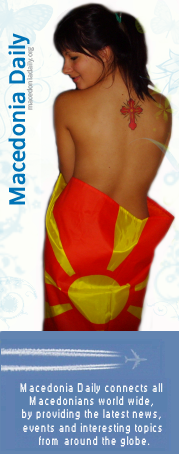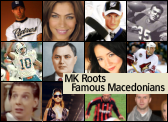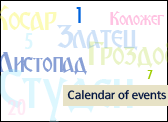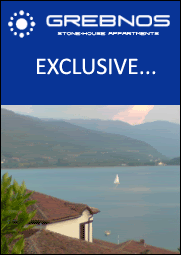PROTESTS IN OHRID

National.
Citizens of Ohrid, angry at the Greek policy towards Macedonia are organising a protest in the city of Ohrid today.
The organisator of the protest, "Hristo Uzunov" anounced that the peacefull protest will start at the "Cinar" square and will lead the protesters in front of the shops of Greek companies; "Cosmofon(Cosmote)", "Germanos", "Stopanska Banka" and "Alfa Banka".
The organisers of the protest also called upon the citizens to boycott every Greek product, in a way to protest against Greece's absurd demands in the name issue.
MD: More and more actions by citizens are taken,this is a good thing, it sends a clear message to Greece and to our government, that the people oppose a name change! Wether it's a good thing to boycott? we don't know.
[Ohridnews]


























Wonderful! So the Hellenic Companies will understand at last that we must leave from your territory and return back. So, your people will stay jobless - I think you have 50% unemployment and the biggest investor in Skopje is Hellas. Wonderful 2. Now you will see what is to be hungry. P.S. In Hellas we protest for the companies which are in Skopje. We claim to return. Leave the Skopjians to deal with Albanians and hunger. Thank you Skopjians. You help us! :-)
Posted by Anonymous |
18:00
Anonymous |
18:00
THE TRUTH ABOUT MACEDONIA!
MACEDONIAN HISTORY AND THE FORGERS OF ALBANIA-FYROM-BULGARIA
The truth about Macedonia...
There is no doupt that ancient Macedonians were Greek. It is thoroughly proved by historic documents and archaeological discoveries which can be found in history books and museums in Greece and arround the world. The most important archeological discovery in Macedonia is the tomb of King Philippos II. It was excavated in Vergina, Greece in 1978 and it proves beyond any doubt the Greekness of ancient Macedonia. All the findings are characteristic of the Greek culture and all the inscriptions are written using the Greek language. Among the discoveries of this tomb is the "Vergina sun" the symbol that FYROM attempted to use on its flag initially.
Facts which prove that ancient Macedonians were Greek people:
• Macedonians spoke a dialect of the Greek language
All the monuments and inscriptions found in the Macedonia are written using the Greek language. Take a look at the archaeological discoveries. There is no historic evidence to suggest that the Macedonians were using a different language.
• Macedonians had Greek names
All the ancient Macedonian names mentioned in history or found on tombs are Greek. All the kings of Ancient Macedonia had Greek names. Nobody discovered ancient Macedonian names ending to -ov or -ovski or whatever.
Alexander's name is Greek. The word "Alexandros" is produced from the prefix alex(=protector) and the word andros(=man) meaning "he who protects men". The prefix "alex" can be found in many Greek words today (alexiptoto=parachute, alexisfairo=bulletproof - all these words have the meaning of protetion).
Philip's name is also Greek. It is produced from the prefix Philo(=friendly to something) and the word ippos(=horse) meaning the man who is friendly to horses. The prefix "philo" and the word "ippos" are also found in many words of Greek origin today (philosophy,philology, hippodrome,hippocampus).
A detailed list of ancient Macedonian names can be found here.
• The regions of ancient Macedonia had Greek names.
The regions which formed ancient Macedonia had Greek names. Most of these names are used in Greece even today.
• Macedonian architecture was similar to the Greek architecture.
All the buldings found in the Macedonia region have many common characteristics with the ones found in the rest of Greece. Palaces, temples, theaters markets are characteristic sampes of ancient Greek architecture.
• Macedonians fought together with the rest of the Greeks.
Macedonians always fought along with the other Greek city-states against enemies from Asia.
• Macedonians took part in the Olympic games.
It is well known then ONLY Greeks were allowed to take part in the ancient Olympic games. For a list of Macedonians who participated in the Olympic Games.
• Macedonians celebrated the same festivals as the rest of the Greeks.
Examples of festivals which were celebrated in Macedonia as well as in other Greek states are the "Hetaireidia", the "Apellaia" and many more.
• Macedonians worshiped the same Gods as the rest of the Greeks.
Several temples dedicated to the Greek Gods have beem discovered in Macedonia and especially in Dion the religious center of ancient Macedonians. It is obvious that the Macedonias worshiped the 12 Olympian Gods as the rest of the Greeks. The Gods were "living" on Mount Olympos which happens to be located in Macedonia. How would that be possible if there was hostility between Macedonians and Greeks? This is another proof that Macedonia was considered a part of Greece.
On the origin of the Macedonians:
The Greek origin of the Macedonians is proven by the vast majority of the ancient historians.
Diodoros of Sicily talks about the links of Alexander to the Greek mythology (Diodoros, Historical Library 17.1.5):
"On his father's side Alexander was a descendant of Heracles and on his mother's he could claim the blood of the Aeacids, so that from his ancestors on both sides he inherited the physical and moral qualities of greatness."
Herodotus confirms that the Macedonians were people of Greek origin (Histories of Herodotus Book 5, paragraph 22.1)
"Now that these descendants of Perdiccas are Greeks, as they themselves say, I myself chance to know and will prove it in the later part of my history.That they are so has been already adjudged by those who manage the Pan-Hellenic contest at Olympia. "
And later on (Book 8, paragraph 137.1) he verifies it:
"This Alexander was seventh in descent from Perdiccas, who got for himself the tyranny of Macedonia in the way that I will show. Three brothers of the lineage of Temenus came as banished men from Argos to Illyria, Gauanes and Aeropus and Perdiccas; and from Illyria they crossed over into the highlands of Macedonia till they came to the town Lebaea."
Also in the very first book of his "Histories" (paragraph 56.3 ) Herodotus states about the origin of the the Greek people :
"For in the days of king Deucalion it inhabited the land of Phthia, then the country called Histiaean, under Ossa and Olympus, in the time of Dorus son of Hellen; driven from this Histiaean country by the Cadmeans, it settled about Pindus in the territory called Macedonian; from there again it migrated to Dryopia, and at last came from Dryopia into the Peloponnese, where it took the name of Dorian."
Thoukididis also verifies that the Macedonian kings' origin was from the Greek town of Argos (Book 2, 99.3):
Are FYROM's residents Macedonians?
A quick review of the Fyromian web sites wil prove that they seem to be confused themselves:
Some of them believe they are descedants of ancient Macedonians
Some of them beleive that they can consider themeselves Macedonians since they live in a part of what used to be ancient Macedonia
Some of them believe they are Macedonians but not directly linked to ancient Macedonians
Some of them believe they are Macedonians because they are free to call themselves as they like(!!!)
The official web site of the president of FYROM states clearly that these people came to Macedonia at the end 10th century:
"The beginnings of the statehood of the Macedonian Slaves go back to the end of the 10th century and beginning of the 11t, with the creation of Samoil's state."
Link:
http://www.president.gov.mk/eng/makedonija.htm
Suggestions
Some suggestions for FYROM's permanent name:
The name this region used since the 2nd world war - Vardarska
The ancient name of the region - Paionia
A name which describes the country geographicaly - Central Balkan Republic
• Bibliography about Macedonia
This is a list of books we recomend for further information about Macedonia and its history. The books listed below are written and published by non Greek authors and publishers so that they may not be characterised as biased.
"A history of Macedonia"
by N G L Hammond
and G T Griffith / F W Walbank
Oxford University Press, 1979
"In the Footsteps of Alexander the Great : A Journey from Greece to Asia"
by Michael Wood,
University of California Press, 1997
"A History of Macedonia (Hellenistic Culture and Society)"
by Robert Malcolm Errington and Catherine Errington
University of California Press, 1993
"Alexander the Great and the Hellenistic Empire"
by A R Burn
The Macmillan Co, New York., 1948
"The nature of Alexander"
by Mary Renault
Penguin Books Ltd, 1975
"Griechische Geschichte : von den Anfanfen bis in die romische Kaiserzeit."
by Hermann Bengtson
Verlag C. Beck, Munchen, 1965
Posted by Anonymous |
19:11
Anonymous |
19:11
For those seeking a name for the Slavic country currently referred to as FYROM, a few things to keep in mind:
1. The name of the area before World War II, was VARDARSKA. The name "Macedonia" was given to them by their Leader Josef Brostein (known as Tito).
2. Alexander the Great and his teacher, Aristotle, were Greek and spoke Greek - not any Slavic language.
3. Slavic tribes originated from the territories of modern Belarus, Poland, European Russia and Ukraine. They migrated to the region during the 6th century, 800 years after Alexander the Great lived.
4. The name ALEXANDER (Αλέξανδρος) derives from the Greek words αλέξω (to repel, shield, protect) and ανήρ (man; genitive case ανδρός), and means "PROTECTOR OF MEN."
5. Alexander's sister had a Greek name, Thessaloniki, as did his famed horse, Voukefalas.
6. The ancient Macedonian capital was Pella in Northern Greece (nothing to do with Slavic Skopje).
So, VARDARSKA it is... We've had enough of this joke.
With Resolution 356, more than 100 members of the US House of Representatives urge the Former Yugoslav Republic of Macedonia (FYROM) to retract "hostile activities or propaganda" - namely its attempts to falsify history and claim Greece's heritage as its own. Examples mentioned in the resolution include the renaming of the country's main airport to "Alexander the Great", creating maps for school and military textbooks showing a "Greater Macedonia" that reaches well into Greece and Bulgaria and teaching school children that parts of Greece, including the Greek region of Macedonia, are rightfully part of the FYROM.
Posted by Anonymous |
22:24
Anonymous |
22:24
To the Greek converts:
read the book “The Kingdom of the Slavs” by Mauro Orbini, published in 1601, in Pezaro, and in particular pages 168 - 171.
Mauro explains clearly that Macedonians were not Greek. His book published in 1601.
Slavs existed even before the first King of Macedonia.
Stop giving us petty little facts with no substance.
Seeing as though you are the experts on history dating back 2500years: If Macedonia was so Greece; Why wasn't Macedonia annexed as a greek state in 2500 BC like Argos, Athens and Sparta?
Posted by Anonymous |
09:00
Anonymous |
09:00
Post a Comment